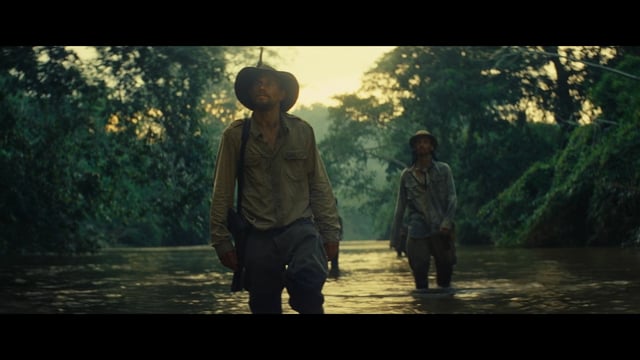
“You’ve come to doubt its existence.”
“No. I only doubt it could provide the answers you seek from it.”
The Lost City of Z delves into destiny and what effect pursuit of it can have on one’s life. Percy originally embarked on his journey in order to cleanse his family name, conquering the demon of his father’s failure of alcoholism and child abandonment, which haunted his life both professionally and personally. Upon completion of his original mission and receiving that initial taste of greater discovery and, therefore, greatness, Percy becomes consumed with finding Z and fulfilling what he has come to believe is his destiny. This fulfillment becomes all consuming and eventually even ensnares his eldest son Jack (Tom Holland). The two embark upon Bolivia once more post-World War I with Percy an old man and Jack a young one. Despite not achieving their aim, Percy tells his son that even in their failure, they’ve seen things that most men could never dream of and as a result, now have achieved a level of understanding of their lives. This dogged pursuit of his destiny until ultimate failure spanning decades of Percy’s life framed destiny and the pursuit of it as a kind of burden that stuck to life, dragging a person down until it consumed them. This point is driven home in the final shot of the film where Percy’s wife Nina (Sienna Miller) walks away from a meeting into a jungle similar to the one in her husband and son had embarked; symbolizing that she would now be yoked with the same anchor of determination in her life, trying to fulfill what she has now taken on as her life’s duty. The weight of assumed unfinished business is heavy.
While also about destiny, the film is also about fathers and sons. As mentioned previously, Percy had his own daddy issues which pushed him to explore the Amazon and this burden was passed onto his eldest son Jack through Percy’s own absence from his life.
Charlie Hunnam is excellent as Percy Fawcett, convincingly portraying an educated man battling an arrogant, skeptical society which views him as being part of a caste just below theirs. My previous view on Hunnam has been that he was a pretty face Hollywood has been trying to make “happen” but I walked away from this film thoroughly impressed with his skill. He became lost in the role after a while and it is the 2nd best performance from a lead actor I’ve seen this so far year. Sienna Miller continues to impress me as an actress in her turn as Nina Fawcett and is genuinely one of my favorite actresses at the moment. Once known just as much for being tabloid fodder as an actress, her long string of standout performances had earned her recognition as one of the best working actresses right now. Robert Pattinson also shines in a supporting role as Henry Costin, Percy’s number two on expedition. Pattinson did so well in fact that I had no clue it was him until after the movie was finished. He continues his post-Twilight reinvention as more than just a teenaged heartthrob.
Despite my love for its themes and the performances of the actors, I do have a large problem with the film’s characterization of Percy Fawcett. The film portrays him and his wife as progressive people, sympathetic to both the racist way that natives are viewed and treated and the social gender norms foisted upon women. In reality, Fawcett was a racist himself; unable to conceive of natives building a civilization pre-dating any Europe, he attributed Z to “white Indians” who somehow made it to South America from Europe and settled. While I am more open than most people to creative license within historical films, this change does alter the narrative of the film slightly and change how audiences would view the main protagonist within the story. While I understand the hesitancy that studios now have to create a potentially loathsome lead in a world where films are being ranked due to online outrage at the social sensibilities, or lack thereof, of characters, great filmmaking is about risk and challenging audiences. Releasing a film where audiences are challenged to view an otherwise revolting character through a sympathetic lense and filmmakers are challenged to craft a film that forces them to would have been much more interesting and impressive than playing it safe and smoothing out the character’s rougher edges. Such substantive changes to a character hurt the film’s credibility in my eyes and ultimately takes some sheen off of an otherwise pristine film.
Despite that gripe, The Lost City of Z is definitely worth your time and attention. It is a two and a half hour film that feels shorter due to remaining engrossing throughout, as well as being thought provoking. If you are a moviegoer who believes that blockbusters are becoming over saturated, supporting a film like The Lost City of Z becomes even more important. Original films like this will not continue to be made if no one watches.
Image: Amazon Studios

